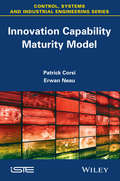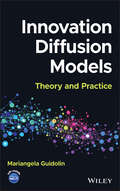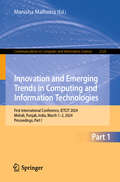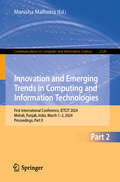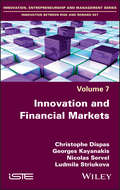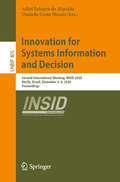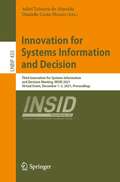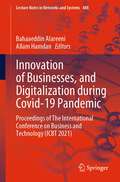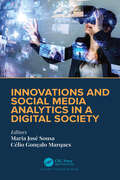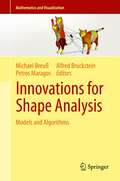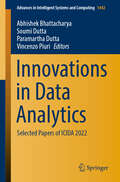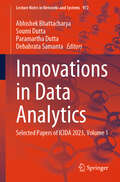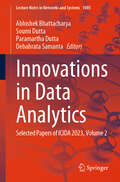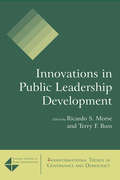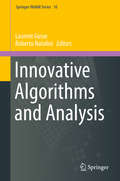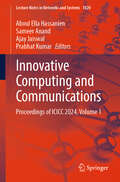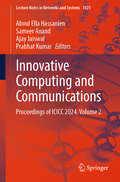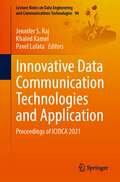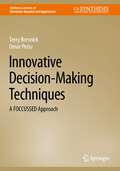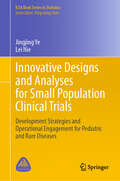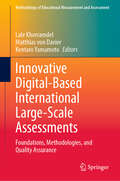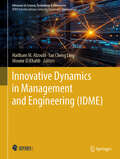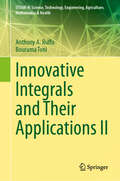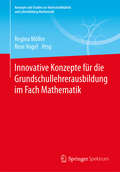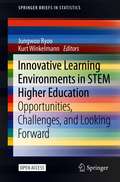- Table View
- List View
Innovation Capability Maturity Model
by Patrick Corsi Erwan NeauWhilst innovation remains of course an approach, a process, and is still often even reduced to a set of results, it essentially reflects a way of thinking evolution. Time is up for varying the thinking methods according to capacities and learned and available competencies with a view to change. . . the thinking level. No domain and no sector is immune to this transformation in todays' world Having clarified our ideas through this book, we remain ever more convinced that the leveled maturity approach will lead to real advances in innovation over the 2020 years. Hence the competitive capacities of organizations must evolve. As we strive in our quest for new inspiration sources in business, let us reckon that all is bound to evolving. . . including the way to evolve. In that resides the very capacity to innovate.
Innovation Diffusion Models: Theory and Practice
by Mariangela GuidolinInnovation Diffusion Models Understand innovation diffusion models and their role in business success Innovation diffusion models are statistical models that predict the medium- and long-term sales performance of new products on a market. They account for numerous factors that contribute to the life cycle of a new product and are subject to continuous reassessment as markets transform and the business world becomes more complex. In a modern market environment where product life cycles are becoming ever shorter, the latest innovation diffusion models are essential for businesses looking to perfect their decision-making processes. Innovation Diffusion Models: Theory and Practice provides a comprehensive and up-to-date guide to these models and their potential to impact product development. It focuses on the latest product diffusion models, which combine time series analysis with nonlinear regression techniques to create increasingly refined predictions. Its combination of mathematical theory and business practice makes it an indispensable tool across many sectors of industry and commerce. Innovation Diffusion Models readers will also find: Real-world examples demonstrating the kinds of data sets generated by new product growth models and their potential applications Discussion of the factors underlying the decision to select a given growth model for a particular product Clear, detailed explanation of each model’s explanatory ability Innovation Diffusion Models is an essential volume for practitioners in any field of industry or commerce, as well as for graduate students and researchers in business and finance.
Innovation and Emerging Trends in Computing and Information Technologies: First International Conference, IETCIT 2024, Mohali, Punjab, India, March 1–2, 2024, Proceedings, Part I (Communications in Computer and Information Science #2125)
by Manisha MalhotraThis book constitutes the proceedings of the First International Conference on Innovation and Emerging Trends in Computing and Information Technologies, IETCIT 2024, held in Mohali, India, in March 1–2, 2024. The 44 full papers presented in these two volumes were carefully reviewed and selected from 417 submissions. The papers are organized in the following topical sections: Part I: machine learning and deep learning; pattern and speech recognition; internet of things (IoT). Part II: data science and data analytics; communication, network and security.
Innovation and Emerging Trends in Computing and Information Technologies: First International Conference, IETCIT 2024, Mohali, Punjab, India, March 1–2, 2024, Proceedings, Part II (Communications in Computer and Information Science #2126)
by Manisha MalhotraThis book constitutes the proceedings of the First International Conference on Innovation and Emerging Trends in Computing and Information Technologies, IETCIT 2024, held in Mohali, India, in March 1–2, 2024. The 44 full papers presented in these two volumes were carefully reviewed and selected from 417 submissions. The papers are organized in the following topical sections: Part I: machine learning and deep learning; pattern and speech recognition; internet of things (IoT). Part II: data science and data analytics; communication, network and security.
Innovation and Financial Markets
by Christophe Dispas Georges Kayanakis Nicolas Servel Ludmila StriukovaCombining insights from academic research and practical examples, this book aims to better understand the link between financial markets and innovation management. First, we are back to the very definition of innovation and what it means for financial and non-financial companies. Then, we analyze if efficient innovation management by companies is recognized and valued by financial markets. Finally, we focus on innovation within the financial sector: does it really create value outside the financial sector itself. Are Financial innovations value … or risk creators?
Innovation for Systems Information and Decision: Second International Meeting, INSID 2020, Recife, Brazil, December 2–4, 2020, Proceedings (Lecture Notes in Business Information Processing #405)
by Adiel Teixeira de Almeida Danielle Costa MoraisThis book constitutes the refereed proceedings of the Second International Meeting on Innovation for Systems Information and Decision meeting, INSID 2020, held in Recife, Brazil, in December 2020. Due to the COVID-19 pandemic the conference was held virtually. The 8 papers presented in this volume were carefully reviewed and selected from a total of 84 submissions to the main conference. The selected papers reflect methodological improvements and advances in Multicriteria Decision-Making/Multicriteria Decision-Aid (MCDM/MCDA) oriented toward real-world applications and contribute to the understanding of relevant developments of current research on and future trends of Innovation for Systems Information and Decision.
Innovation for Systems Information and Decision: Third Innovation for Systems Information and Decision Meeting, INSID 2021, Virtual Event, December 1–3, 2021, Proceedings (Lecture Notes in Business Information Processing #435)
by Adiel Teixeira de Almeida Danielle Costa MoraisThis book constitutes the refereed proceedings of the Third International Meeting on Innovation for Systems Information and Decision, INSID 2021, which was held during December 1-3, 2021. The conference was initially planned to take place in Recife, Brazil, but changed to a virtual meeting due to the COVID-19 pandemic. The 9 full papers presented in this volume were carefully reviewed and selected from a total of 76 submissions. They reflect methodological improvements and advances in multi-criteria decision-making/multi-criteria decision-aid (MCDM/MCDA) oriented toward real-world applications, which contribute to the understanding of relevant developments of current research on and future trends of innovation for systems information and decision.
Innovation of Businesses, and Digitalization during Covid-19 Pandemic: Proceedings of The International Conference on Business and Technology (ICBT 2021) (Lecture Notes in Networks and Systems #488)
by Allam Hamdan Bahaaeddin AlareeniThis book constitutes the refereed proceedings of the International Conference on Business and Technology (ICBT2021) organized by EuroMid Academy of Business & Technology (EMABT), held in Istanbul, between 06–07 November 2021. In response to the call for papers for ICBT2021, 485 papers were submitted for presentation and inclusion in the proceedings of the conference. After a careful blind refereeing process, 292 papers were selected for inclusion in the conference proceedings from forty countries. Each of these chapters was evaluated through an editorial board, and each chapter was passed through a double-blind peer-review process.The book highlights a range of topics in the fields of technology, entrepreneurship, business administration, accounting, and economics that can contribute to business development in countries, such as learning machines, artificial intelligence, big data, deep learning, game-based learning, management information system, accounting information system, knowledge management, entrepreneurship, and social enterprise, corporate social responsibility and sustainability, business policy and strategic management, international management and organizations, organizational behavior and HRM, operations management and logistics research, controversial issues in management and organizations, turnaround, corporate entrepreneurship, innovation, legal issues, business ethics, and firm gerial accounting and firm financial affairs, non-traditional research, and creative methodologies.These proceedings are reflecting quality research contributing theoretical and practical implications, for those who are wise to apply the technology within any business sector. It is our hope that the contribution of this book proceedings will be of the academic level which even decision-makers in the various economic and executive-level will get to appreciate.
Innovations and Social Media Analytics in a Digital Society
by Maria José Sousa and Célio Gonçalo MarquesRecent advances in digitization are transforming healthcare, education, tourism, information technology, and some other sectors. Social media analytics are tools that can be used to measure innovation and the relation of the companies with the citizens. This book comprises state-ofthe-art social media analytics, and advanced innovation policies in the digitization of society. The number of applications that can be used to create and analyze social media analytics generates large amounts of data called big data, including measures of the use of the technologies to develop or to use new services to improve the quality of life of the citizens. Digitization has applications in fields from remote monitoring to smart sensors and other devices. Integration generates data that need to be analyzed and visualized in an easy and clear way, that will be some of the proposals of the researchers present in this book. This volume offers valuable insights to researchers on how to design innovative digital analytics systems and how to improve information delivery remotely.
Innovations for Shape Analysis
by Alfred Bruckstein Michael Breuß Petros MaragosThe concept of 'shape' is at the heart of image processing and computer vision, yet researchers still have some way to go to replicate the human brain's ability to extrapolate meaning from the most basic of outlines. This volume reflects the advances of the last decade, which have also opened up tough new challenges in image processing. Today's applications require flexible models as well as efficient, mathematically justified algorithms that allow data processing within an acceptable timeframe. Examining important topics in continuous-scale and discrete modeling, as well as in modern algorithms, the book is the product of a key seminar focused on innovations in the field. It is a thorough introduction to the latest technology, especially given the tutorial style of a number of chapters. It also succeeds in identifying promising avenues for future research. The topics covered include mathematical morphology, skeletonization, statistical shape modeling, continuous-scale shape models such as partial differential equations and the theory of discrete shape descriptors. Some authors highlight new areas of enquiry such as partite skeletons, multi-component shapes, deformable shape models, and the use of distance fields. Combining the latest theoretical analysis with cutting-edge applications, this book will attract both academics and engineers.
Innovations in Data Analytics: Selected Papers of ICIDA 2022 (Advances in Intelligent Systems and Computing #1442)
by Vincenzo Piuri Paramartha Dutta Abhishek Bhattacharya Soumi DuttaThis book features research papers presented at the 1st International Conference on Innovations in Data Analytics (ICIDA 2022), held at Eminent College of Management and Technology (ECMT), West Bengal, India, during November 29–30, 2022. The book presents original research work in the areas of computational intelligence, advance computing, network security and telecommunication, data science and data analytics, and pattern recognition. The book is beneficial for readers from both academia and industry.
Innovations in Data Analytics: Selected Papers of ICIDA 2023, Volume 1 (Lecture Notes in Networks and Systems #972)
by Paramartha Dutta Abhishek Bhattacharya Soumi Dutta Debabrata SamantaThis book features research papers presented at the 2nd International Conference on Innovations in Data Analytics (ICIDA 2023), held at Eminent College of Management and Technology (ECMT), West Bengal, India during 29 – 30 November 2023. The book presents original research work in the areas of computational intelligence, advance computing, network security and telecommunication, data science and data analytics, and pattern recognition. The book is beneficial for readers from both academia and industry.
Innovations in Data Analytics: Selected Papers of ICIDA 2023, Volume 2 (Lecture Notes in Networks and Systems #1005)
by Paramartha Dutta Abhishek Bhattacharya Soumi Dutta Debabrata SamantaThis book features research papers presented at the 2nd International Conference on Innovations in Data Analytics (ICIDA 2023), held at Eminent College of Management and Technology (ECMT), West Bengal, India during 29 – 30 November 2023. The book presents original research work in the areas of computational intelligence, advance computing, network security and telecommunication, data science and data analytics, and pattern recognition. The book is beneficial for readers from both academia and industry.
Innovations in Public Leadership Development (Transformational Trends In Governance And Democracy Ser.)
by Terry F. Buss Ricardo S. MorseThis is the best single-source guide to leadership development in the public sector. It offers a wealth of advice for teachers, students, trainers, human resource officers, and established leaders. The all-original chapters include discussions of leadership frameworks, competencies for public leaders for the "new governance," and strategies for senior leaders in government.The book's wide-ranging coverage includes in-depth discussions of specific approaches to learning methods such as action learning and social artistry, as well as presentations of leader development models such as transformational stewardship and global leadership. The contributors present experiences from real-world leadership development programs, and the book situates leader development within the current trends of networks, collaboration, and boundary-crossing work in the public sector.
Innovative Algorithms and Analysis
by Laurent Gosse Roberto NataliniThis volume gathers contributions reflecting topics presented during an INDAM workshop held in Rome in May 2016. The event brought together many prominent researchers in both Mathematical Analysis and Numerical Computing, the goal being to promote interdisciplinary collaborations. Accordingly, the following thematic areas were developed: 1. Lagrangian discretizations and wavefront tracking for synchronization models; 2. Astrophysics computations and post-Newtonian approximations; 3. Hyperbolic balance laws and corrugated isometric embeddings; 4. "Caseology" techniques for kinetic equations; 5. Tentative computations of compressible non-standard solutions; 6. Entropy dissipation, convergence rates and inverse design issues. Most of the articles are presented in a self-contained manner; some highlight new achievements, while others offer snapshots of the "state of the art" in certain fields. The book offers a unique resource, both for young researchers looking to quickly enter a given area of application, and for more experienced ones seeking comprehensive overviews and extensive bibliographic references.
Innovative Computing and Communications: Proceedings of ICICC 2024, Volume 1 (Lecture Notes in Networks and Systems #1020)
by Aboul Ella Hassanien Sameer Anand Ajay Jaiswal Prabhat KumarThis book includes high-quality research papers presented at the Seventh International Conference on Innovative Computing and Communication (ICICC 2024), which is held at the Shaheed Sukhdev College of Business Studies, University of Delhi, Delhi, India, on 16–17 February 2024. Introducing the innovative works of scientists, professors, research scholars, students, and industrial experts in the field of computing and communication, the book promotes the transformation of fundamental research into institutional and industrialized research and the conversion of applied exploration into real-time applications.
Innovative Computing and Communications: Proceedings of ICICC 2024, Volume 2 (Lecture Notes in Networks and Systems #1021)
by Aboul Ella Hassanien Sameer Anand Ajay Jaiswal Prabhat KumarThis book includes high-quality research papers presented at the Seventh International Conference on Innovative Computing and Communication (ICICC 2024), which is held at the Shaheed Sukhdev College of Business Studies, University of Delhi, Delhi, India, on 16–17 February 2024. Introducing the innovative works of scientists, professors, research scholars, students, and industrial experts in the field of computing and communication, the book promotes the transformation of fundamental research into institutional and industrialized research and the conversion of applied exploration into real-time applications.
Innovative Data Communication Technologies and Application: Proceedings of ICIDCA 2021 (Lecture Notes on Data Engineering and Communications Technologies #96)
by Pavel Lafata Jennifer S. Raj Khaled KamelThis book presents the latest research in the fields of computational intelligence, ubiquitous computing models, communication intelligence, communication security, machine learning, informatics, mobile computing, cloud computing, and big data analytics. The best selected papers, presented at the International Conference on Innovative Data Communication Technologies and Application (ICIDCA 2021), are included in the book. The book focuses on the theory, design, analysis, implementation, and application of distributed systems and networks.
Innovative Decision-Making Techniques: A FOCCUSSED Approach (Synthesis Lectures on Operations Research and Applications)
by Terry Bresnick Omar PeriuThis book provides a blend of quantitative and qualitative approaches to decision making, while also bridging the gap between the theory of how to make good decisions versus how people actually make decisions. The authors present the tools and techniques of decision analysis to learn how to become a FOCCUSSED decision maker: Identify and properly Frame the decision or problem at handSpecify the goals, Objectives, and values that you are trying to achieveDevelop creative, meaningful Choices from among which you can chooseEvaluate the Consequences of selecting each alternative using your goals, objectives, and valuesThink about the key Uncertainties that could impact the decisionUnderstand the Swaps and trade-offs that you are willing to makeDevelop an approach for implementing your SolutionElicit the data you’ll need from a variety of sourcesand Disseminate and communicate your decisions to others. The authors define a decision as the choice among alternatives, based on how we value and trade-off their pros and cons, made in the face of uncertainty about what will actually happen. The decision-making process is presented as having three pillars to support the decision maker: Preferences–what we prefer, what meets our goals and objectives, and the recognition that preferences are personal to the one making the decision; Alternatives–the choices, options, or courses of action that we have, and over which we have some degree of control; and Information–what we know about the situation, what we don’t know, how we connect choices to outcomes, and how we deal with uncertainty. Key components of good decision-making include how to define your goals and objectives, how to incorporate uncertainties that we all face, and how to develop better alternatives, all of which are discussed. Sophisticated techniques are presented in a way that is accessible to the average decision maker. Probability theory is utilized to improve decisions, and uncertainties are captured in decision trees. Risk avoidance, risk transfer, and risk mitigation are also discussed. Readers will gain a clear understanding of how to articulate the goals and objectives that should be the focal point of any decision.
Innovative Designs and Analyses for Small Population Clinical Trials: Development Strategies and Operational Engagement for Pediatric and Rare Diseases (ICSA Book Series in Statistics)
by Jingjing Ye Lei NieThis book discusses a multidisciplinary and multi-stakeholder collaborative approach to small population clinical trials. It provides and illustrates a systematic framework that depends upon a collaborative infrastructure between the patient community, patient advocacy groups, researchers and investigators, pharmaceutical companies, global regulatory agencies, and customers. The book also highlights the considerations of natural history and patient registry, diagnostic criteria determination, identification of clinically meaningful endpoints, and global regulatory guidance. The authors detail the nuances of clinical trial design as specific to small population disease, drawing from real examples.
Innovative Digital-Based International Large-Scale Assessments: Foundations, Methodologies, and Quality Assurance (Methodology of Educational Measurement and Assessment)
by Matthias Von Davier Kentaro Yamamoto Lale KhorramdelThis edited volume provides a comprehensive overview of the technology-driven innovations that have transformed National and International Large-Scale Assessments over the past decade, along with the research and considerations that have accompanied these changes. It documents the groundwork for ongoing innovations and explores future directions as these assessments continue to evolve. While the impact of technology on education and assessments is difficult to predict, best practices and emerging principles for transitioning from paper-based to digital formats can be described. The volume offers guidelines and examples from experts who have transitioned assessments like PISA, PIAAC, TIMSS, PIRLS, and NAEP into the digital era. It also highlights research on digital-based assessments, showcasing new insights from log file and process data, as well as innovative domains.
Innovative Dynamics in Management and Engineering (Advances in Science, Technology & Innovation)
by Haitham M. Alzoubi Mounir El Khatib Tan Cheng LingThis book acts as a doorway, to the realms of management and engineering uncovering how the merging of these fields is paving the way for developments in business and technology. It provides an exploration of innovations that are reshaping both corporate and technical landscapes encompassing AI, IoT strategic management and operational excellence. This book not only explores into the advancements that are propelling change but also explores the human aspect of business innovation. It examines the evolving roles of leadership emphasizes the significance of cultivating a culture and addresses the challenges involved in navigating change within a dominant era. With insights from industry experts and thought leaders 'Innovative Dynamics in Management and Engineering' presents a wealth of theories, practices and real-life case studies. A must read for those aspiring to lead and thrive in these evolving realms of business and engineering this book equips readers, with knowledge and tools essential to flourish amidst this new era characterized by digital transformation and seamless technological integration.
Innovative Integrals and Their Applications II (STEAM-H: Science, Technology, Engineering, Agriculture, Mathematics & Health)
by Bourama Toni Anthony A. RuffaIn its second installment, Innovative Integrals and Their Applications II explores multidimensional integral identities, unveiling powerful techniques for attacking otherwise intractable integrals, thus demanding ingenuity and novel approaches. This volume focuses on novel approaches for evaluating definite integrals, with the aid of tools such as Mathematica as a means of obtaining useful results. Building upon the previous methodologies, this volume introduces additional concepts such as interchanging the order of integration, permutation symmetry, and the use of pairs of Laplace transforms and Fourier transforms, offering readers a comprehensive array of integral identities. The content further elucidates the techniques of permutation symmetry and extends the multivariate substitution approach to integrals with finite limits of integration. These insights culminate in a collection of integral identities involving gamma functions, incomplete beta functions, Bessel functions, polylogarithms, and the Meijer G-function. Additionally, readers will encounter applications of error functions, inverse error functions, hypergeometric functions, the Lambert W-function, elliptic integrals, Jacobi elliptic functions, and the Riemann zeta function, among many others, with a focus on their relevance in various scientific disciplines and cutting-edge technologies. Each chapter in this volume concludes with many interesting exercises for the reader to practice. A key tenet is that such approaches work best when applied to integrals having certain characteristics as a starting point. Most integrals, if used as a starting point, lead to no result at all, or lead to a known result. However, there is a special class of integrals (i.e., innovative integrals), which, if used as a starting point for such approaches, lead to new and useful results, and can also enable the reader to generate other new results that do not appear in the book. The intended readership includes science, technology, engineering, and mathematics (STEM) undergraduates and graduates, as well as STEM researchers and the community of engineers, scientists, and physicists; most of these potential readers have experienced the importance and/or the applications of integration from finding areas, volumes, lengths, and velocities to more advanced applications. The pedagogical approach of the exposition empowers students to comprehend and efficiently wield multidimensional integrals from their foundations, fostering a deeper understanding of advanced mathematical concepts.
Innovative Konzepte für die Grundschullehrerausbildung im Fach Mathematik (Konzepte und Studien zur Hochschuldidaktik und Lehrerbildung Mathematik)
by Rose Vogel Regina MöllerDer Band stellt innovative Konzepte in der Grundschullehrbildung aus den verschiedenen Bundesländern vor. Anlässe, Innovationen in der Grundschulausbildung vorzustellen und darüber Reflexionen anzuregen, gibt es viele: so zum Beispiel die strukturelle Vielfalt in der Grundschullehrerausbildung in den einzelnen Bundesländern, die unterschiedliche Gewichtung mathematischer und mathematikdidaktischer Kompetenzen im Kontext heterogener Ausbildungsbedingungen und differenzierte Konkretisierungen der Standards für die Lehrerbildung im Fach Mathematik. Im Fokus dieses Bandes stehen hochschuldidaktische Lehrkonzepte im Sinne von good “practice“. Im Einzelnen gilt es darzustellen, auszuloten und zu reflektieren zu welchen Auswirkungen die vorangegangenen Reformen der letzten zwanzig Jahre mit ihrer Neustrukturierung der Lehrerbildung samt gestufter Studienstruktur mit Bachelor- und Masterabschlüssen geführt haben. Neben landespezifischen Akzentsetzungen fokussieren sich diese Bemühungen auf eine stärkere Praxisorientierung während der Ausbildung, auf Intensivierung der Beziehungen zwischen den einzelnen Ausbildungsphasen, auf die besondere Bedeutung der sogenannten Berufseingangsphase und auf Maßnahmen zur Verbesserung der Lehrtätigkeit im Hinblick auf diagnostische und methodische Kompetenzen.
Innovative Learning Environments in STEM Higher Education: Opportunities, Challenges, and Looking Forward (SpringerBriefs in Statistics)
by Kurt Winkelmann Jungwoo RyooAs explored in this open access book, higher education in STEM fields is influenced by many factors, including education research, government and school policies, financial considerations, technology limitations, and acceptance of innovations by faculty and students. In 2018, Drs. Ryoo and Winkelmann explored the opportunities, challenges, and future research initiatives of innovative learning environments (ILEs) in higher education STEM disciplines in their pioneering project: eXploring the Future of Innovative Learning Environments (X-FILEs). Workshop participants evaluated four main ILE categories: personalized and adaptive learning, multimodal learning formats, cross/extended reality (XR), and artificial intelligence (AI) and machine learning (ML). This open access book gathers the perspectives expressed during the X-FILEs workshop and its follow-up activities. It is designed to help inform education policy makers, researchers, developers, and practitioners about the adoption and implementation of ILEs in higher education.
